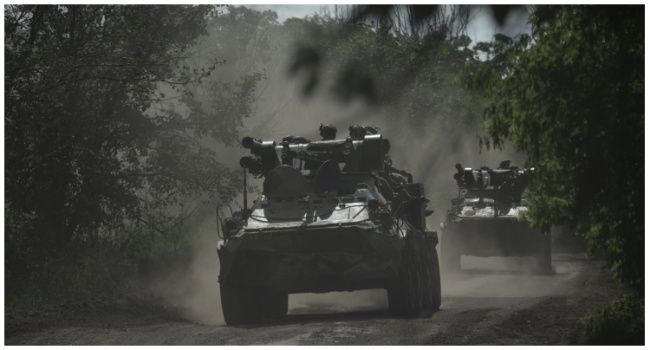Russia not enlisting Nigerians, other Africans to war in exchange for visa renewal – FG

The Federal Government has dismissed media reports suggesting that Russia is allegedly sending thousands of migrants and foreign students to fight alongside its troops in the war against Ukraine for visa renewal.
Earlier, reports emerged that t Russia has been threatening not to extend the visas of African students and young workers, unless they agreed to join the military, according to officials familiar with the matter.

However, the federal government has refuted the reports, stating that it is in communication with Nigerians in the European country.
“The attention of the Ministry of Foreign Affairs has been drawn to news articles published by several Nigerian media outlets on Monday 10th June 2024 informing the public that the Russian Government is engaging Nigerian and other African students to participate in the ongoing war with Ukraine with the promise of visa renewals,” the statement read.
“The Ministry wishes to inform that the Nigerian Embassy in Moscow is in close communication with the executives of the Nigerian Students Association in Moscow, Russia and there has not been any reported case of conscription of Nigerian students nor indeed of other African students to fight in the aforementioned war. The newspaper reports are therefore false and misleading and should therefore be disregarded.
“The Ministry wishes to seize this occasion to appeal to media outlets to exercise due diligence in the line of duty by verifying information at their disposal before releasing it to the public.”
Russia keeps mum
Moscow has also been enlisting convicts from its prisons while some Africans in Russia on work visas have been detained and forced to decide between deportation or fighting, one European official said. Some of those people had been able to bribe officials to stay in the country and still avoid military service, said the official, who, like other people cited, spoke on condition of anonymity.
Russia’s practice of sending migrants and students into battle under duress dates back to earlier in the war, another European official said. Those troops suffer especially high casualty rates because they are increasingly deployed in risky offensive manoeuvres to protect more highly trained units, the official added.
A spokeswoman for the Russian Foreign Ministry didn’t respond to an email seeking comments, according to report published by Channels Television online in Nigeria.
According to reports citing Ukrainian intelligence, Russia has engaged in a global recruitment drive to enlist foreign mercenaries in at least 21 countries, including several nations in Africa. Army recruitment campaigns offer lucrative signing bonuses and salaries for those who’ll join up as contract soldiers. Recruiters have also targeted migrants and students who previously looked for employment in Russia, and in some cases have lured others over with promises of lucrative work before forcing them to train and deploy to the front.
Russia’s ability to mobilise far greater numbers of troops could become a significant factor in the war as President Vladimir Putin seeks to capitalize on a shift in momentum this year.
For now, though, his forces have been grinding forward only slowly in northeastern Ukraine and suffering heavy losses, despite a shortage of troops and ammunition on the Ukrainian side.
The Russian military lost more than 1,200 people a day during May, according to the UK Ministry of Defence, its highest casualty rate of the war. Since the beginning of the invasion, Russia has seen some 500,000 personnel killed or wounded, the UK estimates. Bloomberg is unable to independently verify these figures.
At a meeting with foreign media in St. Petersburg late Wednesday, Putin appeared to imply that about 10,000 Russian troops a month are being killed or wounded and that Ukrainian losses are five times higher.
While the Kremlin has failed to achieve a breakthrough on the battlefield, it has stepped up a bombing campaign against Kharkiv, Ukraine’s second-largest city. Western officials say those attacks appear designed to make the city uninhabitable.
As he seeks to maintain public support in Russia, Putin has so far resisted a full-scale mobilisation and Russia says it has been able to make up a significant share of its losses — in terms of numbers if not the standard of the troops — through a voluntary recruitment drive that has attracted tens of thousands of people.
The government in Kathmandu stated earlier this year that it is aware of approximately 400 young Nepali men who have been recruited by Russia, but many more are likely to have signed up without the government’s knowledge. India’s decision to stop recruiting Nepalese Gurkhas for its army, ending a 200-year-old tradition, may have encouraged Nepalis to seek employment in Russia and other countries.
A senior Ukrainian official said they have seen an uptick in the number of foreign fighters among the prisoners Ukraine has captured on the battlefield. Africans and Nepalis have been particularly common, they said.
Some of Ukraine’s allies have been considering sharing what they know with the affected countries, another European official said.
Group of Seven nations, who will hold a leaders’ summit in Italy next week, have been trying to persuade countries from the so-called Global South to offer more support to Ukraine. But many of those nations have instead remained neutral, while their populations have been a focus for Moscow’s disinformation efforts.
Reuters reported last year that the mercenary group Wagner had recruited several African citizens as part of a drive to enlist convicts from Russian prisons for its forces in Ukraine. The news agency traced the story of three men from Tanzania, Zambia and the Ivory Coast.
There are 35,000-37,000 African students currently in Russia, according to Yevgeny Primakov head of Rossotrudnichestvo, an organization devoted to spreading knowledge about Russia abroad.
“Every year we sign up about 6,500 students from Africa to study in Russia for free,” he said on Thursday at the St. Petersburg International Economic Forum.








